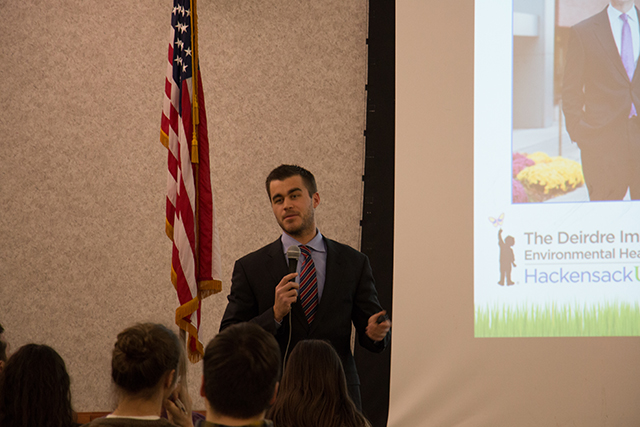
Photo by Pauline Park
The College’s Master in Sustainability Studies program has launched a lecture series in partnership with the Bachelor and Master of Science in Nursing programs. Last Wednesday was the first of the lecture series, with an event entitled “Advancing Sustainability in Healthcare” in Friends Hall. The speaker was Kyle Tafuri, an alumnus of Ramapo College, who is currently the senior sustainability advisor for Hackensack University Medical Center.
The lecture was centered around the “challenges of establishing and achieving sustainable practices in a large healthcare setting,” according to the press release about the event.
Tafuri has made many sustainable advancements at the Hackensack University Medical Center, along with his team, including changes in water conservation, medical waste education and recycling efforts. He also helped the center create a sustainable rooftop garden. Tafuri and his team earned multiple environmental excellence awards and helped make the Hackensack University Medical Center one of the top 25 green hospitals in the country.
Tafuri stressed the importance of advancing sustainability in healthcare because hospitals are run seven days a week, 24 hours a day, and therefore are the largest energy users in the region. Tafuri also explained to the audience that nurses have the highest profession vulnerable to asthma because of how long and how frequently they are exposed to chemicals. The environments that nurses work in, such as the operation room and the emergency room, use and produce countless amount of chemicals and waste. Many people, including those who utilize, work for and run hospitals, tend to forget about the unnecessary material waste production that occurs in the operating room and the emergency room and only focus on getting people treated quickly.
Tafuri mentioned that because the United States tends to be relatively late with chemical regulations compared to other countries, nurses at Hackensack University Medical Center, especially those working in the NICU, go through their lists of medications and chemicals, scanning for harmful or potent ingredients. HUMC, overall, tries to look at the chemicals that are injected or exposed to both the patients and their nurses.
HUMC also makes sure that the furniture it uses is completely safe and healthy for its patients and employees. For example, they make sure that none of the ingredients of the hospital mattresses are carcinogenic, meaning that they could cause cancer. Flame-retardant sofas and mattresses have been found to do more harm than good, because “they aren’t going to save you from the fire,” Tafuri explained.
Throughout the hour-long discussion, Tafuri raised awareness about the importance of sustainability in healthcare, going into detail and giving specific examples.
Janna Appelstein, a junior psychology major, felt that the lecture was “very inspiring … He was a really impressive speaker and really confident, and it was definitely worth attending.”
ppark1@ramapo.edu






